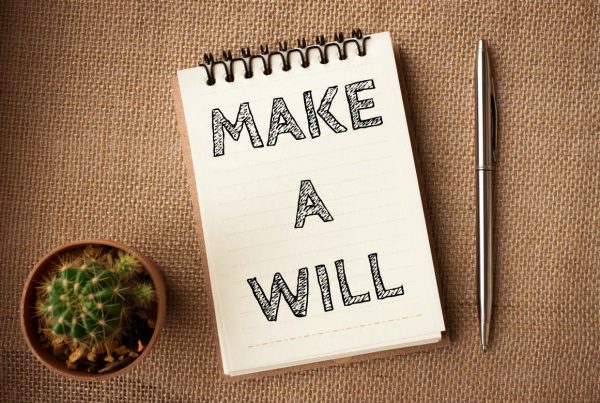The only way to have any certainty about what will happen to your assets and possessions after your death is to make a Will. If you don’t, your loved ones will need to rely on the Law of Succession to decide who should get what. Does that worry you? It should! Making a Will isn’t just a sensible thing to do, it also gives you peace of mind knowing that you’ve clearly set out what you wish to happen to your estate after you’ve gone. Even if you’ve already made a Will, have your circumstances changed? There’s little point in having a Will that doesn’t reflect your current situation. Many people don’t fully understand how a Will is made up and what it contains. A Will is an important legal document and some of its terms appear to be quite technical. We take the view that it should be as simple and straight forward as possible. It should set out, clearly and concisely, exactly what you would like to happen after you’ve passed away. In this article, we’ll look at what your Will is likely to contain and how it will be laid out.
The executor
The executor is the person or people you appoint to deal with your estate. Your Will contains instructions about how you wish your assets and liabilities dealt with and that means someone has to carry out those instructions. This person is your executor. It’s prudent to appoint someone who will be able and willing to efficiently deal with the instructions in your Will. It’s also advisable to have more than one executor just in case the executor you’ve appointed should pass away before you or lose their mental capacity. Once you’ve decided on who you want to be your executor, you should then start to make a list of all your assets and possessions as well as your liabilities.
Your assets and liabilities
Your assets are all the things you own. Sometimes you own things outright and on other occasions, these are owned jointly. There will be things like your home, any money you have in the bank or building society, insurance policies or stocks and shares. These also include any jewellery, antiques or artwork or, indeed, anything you own of any value.If you have a business, you’ll need to consider if you have to make any special arrangements about that and whether there may be other documents in place that deal with your interest in your business that could, potentially, conflict with the terms of your Will. It’s important you include everything you own at this point (although that is likely to change as time goes on). From a liabilities point of view, you should list all of your current debts – your mortgage, credit cards and store accounts, any loans you have or HP contact for, for instance, your car. Again, these are likely to be very fluid but it’s best to get an idea of the extent of these as all of these debts at the time of your death need to be paid off from your assets once you’ve gone.
Who do you want to inherit your estate?
Now that you’ve created your list of assets and liabilities, the next stage is to decide what you want to leave and to whom. There are some things we should point out before you start dividing up your estate. Family relationships can be very complex, especially if you’re in a second or third relationship and there are children from previous relationships. You also have to be aware that a former spouse or partner may have certain rights if you haven’t been formally divorced. You also need to be aware that it’s very difficult to disinherit your children in Scotland because they have a legal entitlement to what are known as Legal Rights to your estate and these will apply whether you make a Will or not. We will go through all of this with you when we’re helping you prepare your Will.
Legacies and bequests
If you wish to leave a specific item or a specific amount of money or percentage of your estate to an individual, charity or other organisation you can do that. These are called legacies and bequests. You simply list what you’d like to leave and to whom. It also pays to think about what might happen if the person or people you’ve decided to leave something to should die before you. Do you want that bequest to go to someone else should that happen? If you’ve decided to leave something to a charity, you might want to make a provision as to what should happen should the charity no longer exist by the time you’ve passed away.
Your house
Sometimes dealing with the house can be really complicated. Much will depend on whose name the house is in. Is it in your name alone or joint names with someone else? If it’s in joint names, does the title contain a “survivorship destination”? If it does contain a “survivorship destination” that means your share in the title automatically transfers to the joint owner’s name on your death without any formality at all- and it doesn’t matter what your Will says about it. You need to be especially careful if the house is in your name alone. Do you want your spouse or partner to live in it after your death? Do you want to transfer ownership to that person? If you’re married and have children, there are certain Inheritance Tax allowances you might want to take advantage of. All of this needs to be taken into account when you’re making your Will.
Everything else – the residue
We finally then need to deal with what’s called “the residue”. That’s everything else not specifically mentioned. Every Will should have a residue clause even if you’ve been very specific with your legacies and bequests. One of the main reasons for this is that you prepare your Will at a certain point in time and anticipate how you’d like your estate dealt with after you’ve gone – but it’s very likely that your assets and liabilities will change between these two dates and you’re likely to own assets that you didn’t have when you made your Will – and if you haven’t made provision for them, your loved ones would need to go to court to give your executor the authority to deal with them. In such a case, that part of your estate would be “intestate” and would have to be dealt with in accordance with the Law of Succession. So, having a residue clause is essential in every Will.
A word about young children
If you have young children you might want to think about appointing a guardian to look after them if you die before they’ve reached the age of majority and can’t look after themselves
Some other things to think about
Do you own any property abroad? If you do, you should make a Will in that country because it’s likely that different laws of succession will apply. Have you thought about your funeral and do you wish to make any special arrangements? Is your preference to be buried or cremated? These are just some of the things you should consider.
We are happy to help
Don’t put it off. Do the responsible thing and make or review your Will. Call us now at Clark Boyle on 0141 227 2200, email Joan Nimmo or use the contact link below for further information/arrange an appointment.





